2023_LIGHTWEIGHT AND HIGH-FIDELITY END-TO-END TEXT-TO-SPEECH WITH MULTI-BAND GENERATION AND INVERSE SHORT-TIME FOURIER TRANSFORM
Paper:https://arxiv.org/pdf/2210.15975.pdf
目录

【PS2】AttributeError: 'HParams' object has no attribute 'seed'
【PS3】EOFError: Ran out of input
【PS5】 TypeError: __init__() takes 1 positional argument but 2 were given
1.论文详解
1.1.介绍
介绍了之前的俩阶段语音合成(声学模型和Vocoders),因为VITS是高质量端到端的模型,所以论文提出的模型是基于VITS轻量级的端到端模型,论文主要几种在模型的解码部分,也就是转换潜在的声学特征到wavaform,用简单的反向短时傅立叶变换 (iSTFT)代替一部分解码器,以高效地完成频域到时域的转换.在推理提升速度时,使用多段处理。在提出的方法时,每一个iSTFTNet,子段信号。推理时,比原本的VITS快了4.1倍,
1.2.VITS算法
1.2.1.简短的介绍了vits的原理,这里不过多介绍,更多可查看【VITS论文总结及项目复现】
1.2.2.每个模型的推理速度
这里用RTF计算,也就是时间token除以合成的语音长度,作为客观标准。
1.3.提出的方法
1.3.1.在输出层将原本的vits中HiFi-GAN替换成样本反向短时傅立叶变换
1.3.2.多段反向短时傅立叶变换变量自动编码(Multi-band iSTFT VITS)
下图为模型的整体框架,

1.3.3.多流反向短时傅立叶变换变量自动编码(Multi-stream iSTFT VITS)
与 MB-iSTFT-VITS 不同,MS-iSTFT-VITS波形是完全可训练的,不再受固定子带信号的限制。
1.4.实验
数据集 : LJ Speech dataset
比较了5种基于vits的模型:
- VITS: 正式的VITS1,其超参数与原始 VITS 相同。
- Nix-TTS:Nix-TTS 的预训练模型2. 使用的模型是经过优化的 ONNX 版本 [27]。请注意,实验中使用的数据集与 Nix-TTS 使用的数据集完全相同。
- iSTFT-VITS :将 iSTFTNet 纳入 VITS 解码器部分的模型。iSTFTNet 的架构为 V1-C8C8I,这是 [14] 中描述的最佳平衡模型。该架构包含两个上采样比例为[8, 8]. 快速傅立叶变换(FFT)的大小、跳变长度和窗口长度分别设置为 16、4 和16。
- MB-iSTFT-VITS 第 3.2 节中介绍的一个拟议模型。子频带数 N 设为 4。两个残差块的上采样比例为 [4,4],以匹配每个子带信号分解后的分辨率。pseudo-QMF的分析滤波器分解的每个子带信号的分辨率相匹配。iSTFT 部分的 FFT 大小、跳变长度和窗口长度与伪 QMF 分析滤波器分解的各子波段信号的分辨率相同。
- MS-iSTFT-VITS: 第 3.3 节中介绍的另一种拟议模型。根据 [10],基于卷积的可训练合成滤波器的内核大小设定为 63,不带偏差。可训练合成滤波器的核大小设定为 63,没有偏差。其他条件与 MB-iSTFT-VITS 相同。
下图为比较结果
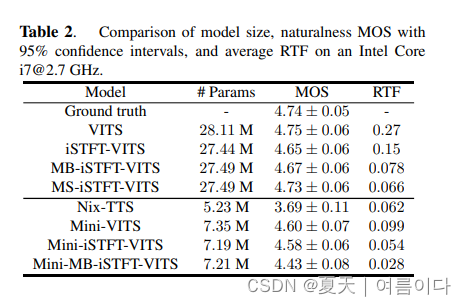
1.5.结论
在本文中,提出了一种端到端 TTS 系统,该系统能够在设备上实现高速语音合成。提出的方法是在名为 VITS 的成功端到端模型的基础上构建的,但采用了几种技术来加快推理速度,例如通过 iSTFT 减少解码器计算的冗余,以及采用多波段并行策略.由于所提出的模型是以完全端到端方式进行优化的,与传统的两阶段方法相比,所提出的模型可以充分享受其强大的优化过程。实验结果表明方法生成的语音与 VITS 合成的语音一样自然,同时还能以更快的速度生成波形。未来的研究包括将提出的方法扩展到多扬声器模型。
2.项目实现
2.1.数据准备
准备的语音数据必须是22050Hz,单通道(Mono),PCM-16bit
单人
dataset/001.wav|您好
dataset/001.wav|안녕하세요
dataset/001.wav|こんにちは。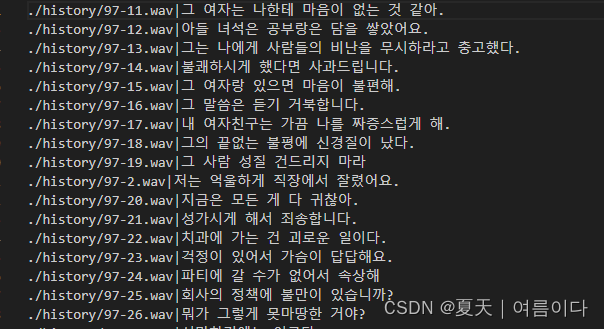
多人
dataset/001.wav|0|こんにちは。中间数字是人物序号ID,从0开始
# Cython-version Monotonoic Alignment Search
cd monotonic_align
mkdir monotonic_align
python setup.py build_ext --inplace论文提供了几种训练结构,因为在论文中MB-iSTFT-VITS效果最好,本文使用此模型
改变training_files` 和 `validation_files`处的路径
新建一个自己数据集的config.json文件
修改:
"training_files":"./filelists/history_train_filelist.txt.cleaned",
"validation_files":"./filelists/history_train_filelist.txt.cleaned",
"text_cleaners":["cjke_cleaners2"], #多语言自定义函数
# "text_cleaners":["korean_cleaners"], #训练语言2.2.数据预处理
# Single speaker
# python preprocess.py --text_index 1 --filelists path/to/filelist_train.txt path/to/filelist_val.txt --text_cleaners 'japanese_cleaners'
#本文实例
# 方法一:声学模型(暂时未运行)
python preprocess.py --text_index 1 --filelists ./filelists/history_train_filelist.txt ./filelists/history_val_filelist.txt --text_cleaners 'korean_cleaners'
# 方法二:G2p模型
python preprocess.py --text_index 1 --filelists ./filelists/history_train_filelist.txt ./filelists/history_val_filelist.txt --text_cleaners 'cjke_cleaners2'
# Mutiple speakers
python preprocess.py --text_index 2 --filelists path/to/filelist_train.txt path/to/filelist_val.txt --text_cleaners 'japanese_cleaners'运行后生成
2.3.对于文本的处理
中英韩日对文本的处理稍微有一点点差异
包含了文本处理,转化方式,文本正则化,符号处理
2.4.训练
# 单人
#python train_latest.py -c <config> -m <folder>
python train_latest.py -c configs/myvoice.json -m myvoice_model(文件夹名称,随便起)
# 多人
#python train_latest_ms.py -c <config> -m <folder>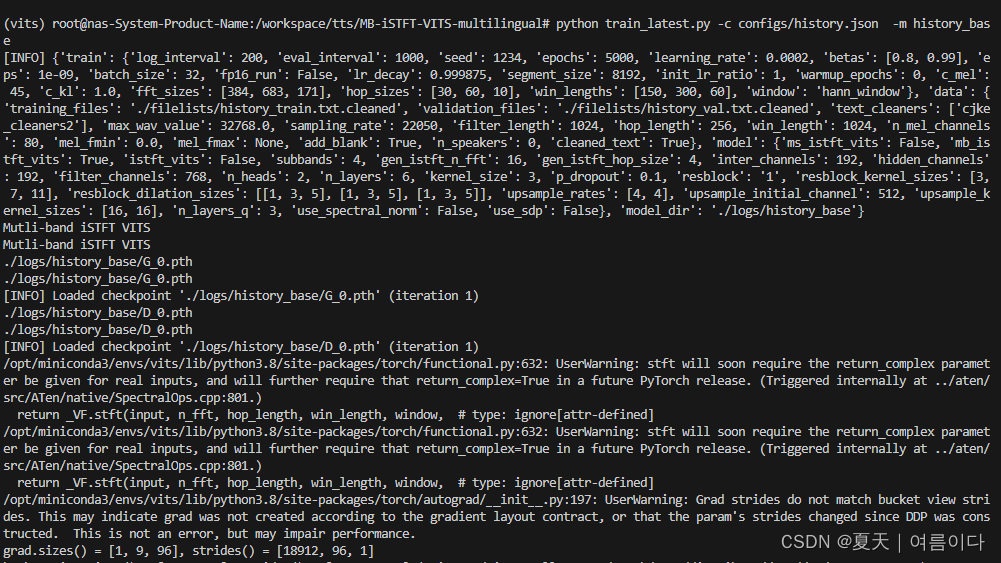

训练后都存放着在logs文件夹下
2.5.推理
import warnings
warnings.filterwarnings(action='ignore')
import os
import time
import torch
import utils
import argparse
import commons
import utils
from models import SynthesizerTrn
from text.symbols import symbols
from text import cleaned_text_to_sequence
#日语from g2p import pyopenjtalk_g2p_prosody
#韩语
from g2pk2 import G2p
import soundcard as sc
import soundfile as sf
def get_text(text, hps):
text_norm = cleaned_text_to_sequence(text)
if hps.data.add_blank:
text_norm = commons.intersperse(text_norm, 0)
text_norm = torch.LongTensor(text_norm)
return text_norm
def inference(args):
config_path = args.config
G_model_path = args.model_path
# check device
if torch.cuda.is_available() is True:
print("Enter the device number to use.")
key = input("GPU:0, CPU:1 ===> ")
if key == "0":
device="cuda:0"
elif key=="1":
device="cpu"
print(f"Device : {device}")
else:
print(f"CUDA is not available. Device : cpu")
device = "cpu"
# load config.json
hps = utils.get_hparams_from_file(config_path)
# load checkpoint
net_g = SynthesizerTrn(
len(symbols),
hps.data.filter_length // 2 + 1,
hps.train.segment_size // hps.data.hop_length,
**hps.model).cuda()
_ = net_g.eval()
_ = utils.load_checkpoint(G_model_path, net_g, None)
# play audio by system default
speaker = sc.get_speaker(sc.default_speaker().name)
# parameter settings
noise_scale = torch.tensor(0.66) # adjust z_p noise
noise_scale_w = torch.tensor(0.8) # adjust SDP noise
length_scale = torch.tensor(1.0) # adjust sound length scale (talk speed)
if args.is_save is True:
n_save = 0
save_dir = os.path.join("./infer_logs/")
os.makedirs(save_dir, exist_ok=True)
### Dummy Input ###
with torch.inference_mode():
#日语stn_phn = pyopenjtalk_g2p_prosody("速度計測のためのダミーインプットです。")
stn_phn = G2p("소프트웨어 교육의 중요성이 날로 더해가는데 학생들은 소프트웨어 관련 교육을 쉽게 지루해해요")
stn_tst = get_text(stn_phn, hps)
# generate audio
x_tst = stn_tst.cuda().unsqueeze(0)
x_tst_lengths = torch.LongTensor([stn_tst.size(0)]).cuda()
audio = net_g.infer(x_tst,
x_tst_lengths,
noise_scale=noise_scale,
noise_scale_w=noise_scale_w,
length_scale=length_scale)[0][0,0].data.cpu().float().numpy()
while True:
# get text
text = input("Enter text. ==> ")
if text=="":
print("Empty input is detected... Exit...")
break
# measure the execution time
torch.cuda.synchronize()
start = time.time()
# required_grad is False
with torch.inference_mode():
#日语stn_phn = pyopenjtalk_g2p_prosody(text)
#韩语
stn_phn = G2p(text)
stn_tst = get_text(stn_phn, hps)
# generate audio
x_tst = stn_tst.cuda().unsqueeze(0)
x_tst_lengths = torch.LongTensor([stn_tst.size(0)]).cuda()
audio = net_g.infer(x_tst,
x_tst_lengths,
noise_scale=noise_scale,
noise_scale_w=noise_scale_w,
length_scale=length_scale)[0][0,0].data.cpu().float().numpy()
# measure the execution time
torch.cuda.synchronize()
elapsed_time = time.time() - start
print(f"Gen Time : 0.0621")
# play audio
speaker.play(audio, hps.data.sampling_rate)
# save audio
if args.is_save is True:
n_save += 1
data = audio
try:
save_path = os.path.join(save_dir, str(n_save).zfill(3)+f"_{text}.wav")
sf.write(
file=save_path,
data=data,
samplerate=hps.data.sampling_rate,
format="WAV")
except:
save_path = os.path.join(save_dir, str(n_save).zfill(3)+f"_{text[:10]}〜.wav")
sf.write(
file=save_path,
data=data,
samplerate=hps.data.sampling_rate,
format="WAV")
print(f"Audio is saved at : {save_path}")
return 0
if __name__ == "__main__":
parser = argparse.ArgumentParser()
parser.add_argument('--config',
type=str,
required=True,
#default="./logs/ITA_CORPUS/config.json" ,
help='Path to configuration file')
parser.add_argument('--model_path',
type=str,
required=True,
#default="./logs/ITA_CORPUS/G_1200.pth",
help='Path to checkpoint')
parser.add_argument('--is_save',
type=str,
default=True,
help='Whether to save output or not')
args = parser.parse_args()
inference(args)如果出错,请查看【PS5】
【PS】
【PS1】ERROR: Could not build wheels for pyopenjtalk, which is required to install pyproject.toml-based projects
在安装时pip install -r requirements.txt出现以下错误
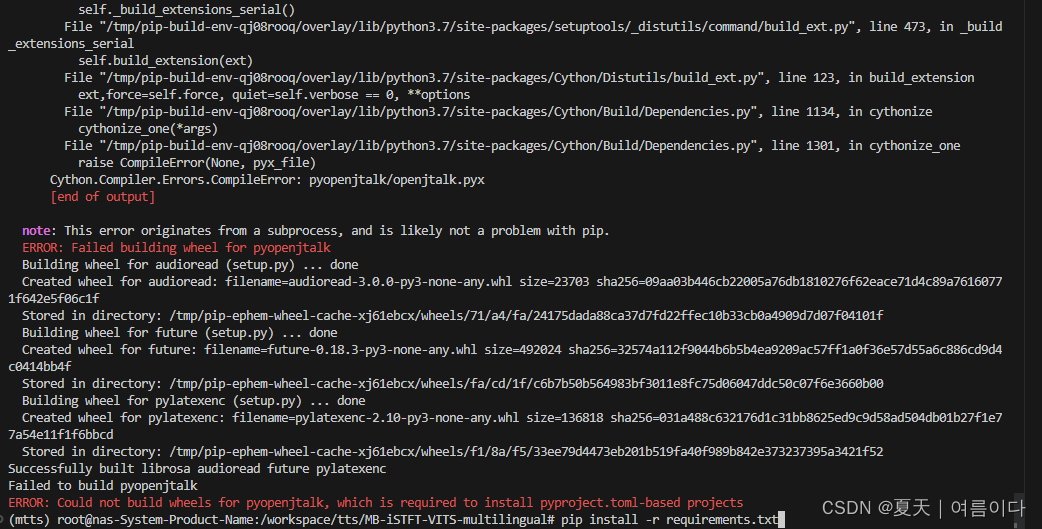
参考1
尝试
pip install pycocotools -i https://pypi.python.org/simple依旧出错
【PS2】AttributeError: 'HParams' object has no attribute 'seed'
config中配置文件缺少seed
重新修改配置文件
【PS3】EOFError: Ran out of input
作者默认训练的gpu个数5
将num_worker改为0
然后又出现

将/workspace/tts/MB-iSTFT-VITS-multilingual/text/__init__.py中更改第35行,改为
sequence = [_symbol_to_id[symbol] for symbol in cleaned_text if symbol in _symbol_to_id.keys()]
【PS4】数据未生成对应的spec.pt文件
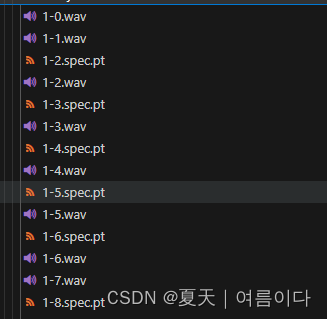
【PS5】 TypeError: __init__() takes 1 positional argument but 2 were given
对与不同语言文字的处理库不同,
【PS6】Traceback (most recent call last):
File "sc_test.py", line 2, in <module>
import soundcard
File "/opt/miniconda3/envs/vits/lib/python3.8/site-packages/soundcard/__init__.py", line 4, in <module>
from soundcard.pulseaudio import *
File "/opt/miniconda3/envs/vits/lib/python3.8/site-packages/soundcard/pulseaudio.py", line 265, in <module>
_pulse = _PulseAudio()
File "/opt/miniconda3/envs/vits/lib/python3.8/site-packages/soundcard/pulseaudio.py", line 76, in __init__
assert self._pa_context_get_state(self.context)==_pa.PA_CONTEXT_READY
AssertionError
参考
扩展
多语言处理方法介绍
韩语
- korean to ipa
scarletcho/KoG2P: Korean grapheme-to-phone conversion in Python (github.com)
方法1:韩语转音素(G2p)

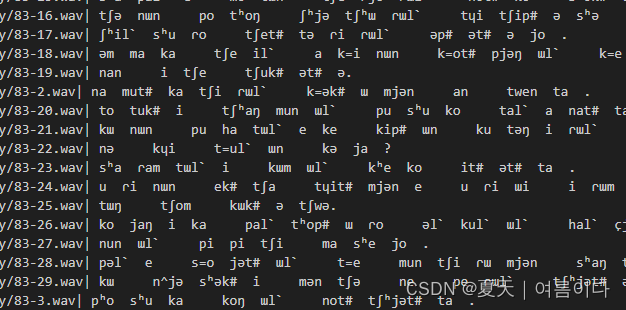
固定数据格式
修改/workspace/tts/MB-iSTFT-VITS-multilingual/text/__init__.py和cleaners.py中对文本的处理
修改配置文件/workspace/tts/MB-iSTFT-VITS-multilingual/configs/自己的数据集名称.json
from text.korean import latin_to_hangul, number_to_hangul, divide_hangul, korean_to_lazy_ipa, korean_to_ipa
from g2pk2 import G2p
def cjke_cleaners2(text):
text = re.sub(r'(.*?)',
lambda x: korean_to_ipa(x.group(1))+' ', text)
text = re.sub(r'\s+$', '', text)
text = re.sub(r'([^\.,!\?\-…~])$', r'\1.', text)
for texts in text:
cleaned_text = korean_to_ipa(text[4:-4])
if re.match(r'[^\.,!\?\-…~]', text[-1]):
text += '.'
return text方法2:声学模型
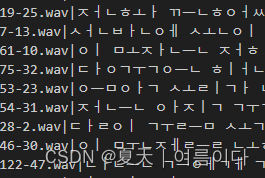
对于文本的处理
在韩文中,除了作者提供的方式
首先增加korean.py,包含对韩文,以及标点符号等处理方式,以下是具体代码
import re
from jamo import h2j, j2hcj
import ko_pron
# This is a list of Korean classifiers preceded by pure Korean numerals.
_korean_classifiers = '군데 권 개 그루 닢 대 두 마리 모 모금 뭇 발 발짝 방 번 벌 보루 살 수 술 시 쌈 움큼 정 짝 채 척 첩 축 켤레 톨 통'
# List of (hangul, hangul divided) pairs:
_hangul_divided = [(re.compile('%s' % x[0]), x[1]) for x in [
('ㄳ', 'ㄱㅅ'),
('ㄵ', 'ㄴㅈ'),
('ㄶ', 'ㄴㅎ'),
('ㄺ', 'ㄹㄱ'),
('ㄻ', 'ㄹㅁ'),
('ㄼ', 'ㄹㅂ'),
('ㄽ', 'ㄹㅅ'),
('ㄾ', 'ㄹㅌ'),
('ㄿ', 'ㄹㅍ'),
('ㅀ', 'ㄹㅎ'),
('ㅄ', 'ㅂㅅ'),
('ㅘ', 'ㅗㅏ'),
('ㅙ', 'ㅗㅐ'),
('ㅚ', 'ㅗㅣ'),
('ㅝ', 'ㅜㅓ'),
('ㅞ', 'ㅜㅔ'),
('ㅟ', 'ㅜㅣ'),
('ㅢ', 'ㅡㅣ'),
('ㅑ', 'ㅣㅏ'),
('ㅒ', 'ㅣㅐ'),
('ㅕ', 'ㅣㅓ'),
('ㅖ', 'ㅣㅔ'),
('ㅛ', 'ㅣㅗ'),
('ㅠ', 'ㅣㅜ')
]]
# List of (Latin alphabet, hangul) pairs:
_latin_to_hangul = [(re.compile('%s' % x[0], re.IGNORECASE), x[1]) for x in [
('a', '에이'),
('b', '비'),
('c', '시'),
('d', '디'),
('e', '이'),
('f', '에프'),
('g', '지'),
('h', '에이치'),
('i', '아이'),
('j', '제이'),
('k', '케이'),
('l', '엘'),
('m', '엠'),
('n', '엔'),
('o', '오'),
('p', '피'),
('q', '큐'),
('r', '아르'),
('s', '에스'),
('t', '티'),
('u', '유'),
('v', '브이'),
('w', '더블유'),
('x', '엑스'),
('y', '와이'),
('z', '제트')
]]
# List of (ipa, lazy ipa) pairs:
_ipa_to_lazy_ipa = [(re.compile('%s' % x[0], re.IGNORECASE), x[1]) for x in [
('t͡ɕ','ʧ'),
('d͡ʑ','ʥ'),
('ɲ','n^'),
('ɕ','ʃ'),
('ʷ','w'),
('ɭ','l`'),
('ʎ','ɾ'),
('ɣ','ŋ'),
('ɰ','ɯ'),
('ʝ','j'),
('ʌ','ə'),
('ɡ','g'),
('\u031a','#'),
('\u0348','='),
('\u031e',''),
('\u0320',''),
('\u0339','')
]]
def latin_to_hangul(text):
for regex, replacement in _latin_to_hangul:
text = re.sub(regex, replacement, text)
return text
def divide_hangul(text):
text = j2hcj(h2j(text))
for regex, replacement in _hangul_divided:
text = re.sub(regex, replacement, text)
return text
def hangul_number(num, sino=True):
'''Reference https://github.com/Kyubyong/g2pK'''
num = re.sub(',', '', num)
if num == '0':
return '영'
if not sino and num == '20':
return '스무'
digits = '123456789'
names = '일이삼사오육칠팔구'
digit2name = {d: n for d, n in zip(digits, names)}
modifiers = '한 두 세 네 다섯 여섯 일곱 여덟 아홉'
decimals = '열 스물 서른 마흔 쉰 예순 일흔 여든 아흔'
digit2mod = {d: mod for d, mod in zip(digits, modifiers.split())}
digit2dec = {d: dec for d, dec in zip(digits, decimals.split())}
spelledout = []
for i, digit in enumerate(num):
i = len(num) - i - 1
if sino:
if i == 0:
name = digit2name.get(digit, '')
elif i == 1:
name = digit2name.get(digit, '') + '십'
name = name.replace('일십', '십')
else:
if i == 0:
name = digit2mod.get(digit, '')
elif i == 1:
name = digit2dec.get(digit, '')
if digit == '0':
if i % 4 == 0:
last_three = spelledout[-min(3, len(spelledout)):]
if ''.join(last_three) == '':
spelledout.append('')
continue
else:
spelledout.append('')
continue
if i == 2:
name = digit2name.get(digit, '') + '백'
name = name.replace('일백', '백')
elif i == 3:
name = digit2name.get(digit, '') + '천'
name = name.replace('일천', '천')
elif i == 4:
name = digit2name.get(digit, '') + '만'
name = name.replace('일만', '만')
elif i == 5:
name = digit2name.get(digit, '') + '십'
name = name.replace('일십', '십')
elif i == 6:
name = digit2name.get(digit, '') + '백'
name = name.replace('일백', '백')
elif i == 7:
name = digit2name.get(digit, '') + '천'
name = name.replace('일천', '천')
elif i == 8:
name = digit2name.get(digit, '') + '억'
elif i == 9:
name = digit2name.get(digit, '') + '십'
elif i == 10:
name = digit2name.get(digit, '') + '백'
elif i == 11:
name = digit2name.get(digit, '') + '천'
elif i == 12:
name = digit2name.get(digit, '') + '조'
elif i == 13:
name = digit2name.get(digit, '') + '십'
elif i == 14:
name = digit2name.get(digit, '') + '백'
elif i == 15:
name = digit2name.get(digit, '') + '천'
spelledout.append(name)
return ''.join(elem for elem in spelledout)
def number_to_hangul(text):
'''Reference https://github.com/Kyubyong/g2pK'''
tokens = set(re.findall(r'(\d[\d,]*)([\uac00-\ud71f]+)', text))
for token in tokens:
num, classifier = token
if classifier[:2] in _korean_classifiers or classifier[0] in _korean_classifiers:
spelledout = hangul_number(num, sino=False)
else:
spelledout = hangul_number(num, sino=True)
text = text.replace(f'{num}{classifier}', f'{spelledout}{classifier}')
# digit by digit for remaining digits
digits = '0123456789'
names = '영일이삼사오육칠팔구'
for d, n in zip(digits, names):
text = text.replace(d, n)
return text
def korean_to_lazy_ipa(text):
text = latin_to_hangul(text)
text = number_to_hangul(text)
text=re.sub('[\uac00-\ud7af]+',lambda x:ko_pron.romanise(x.group(0),'ipa').split('] ~ [')[0],text)
for regex, replacement in _ipa_to_lazy_ipa:
text = re.sub(regex, replacement, text)
return text
def korean_to_ipa(text):
text = korean_to_lazy_ipa(text)
return text.replace('ʧ','tʃ').replace('ʥ','dʑ')
然后在/workspace/tts/MB-iSTFT-VITS-multilingual/text/cleaners.py中进行调用
from text.korean import latin_to_hangul, number_to_hangul, divide_hangul, korean_to_lazy_ipa, korean_to_ipa
def korean_cleaners(text):
#Pipeline for Korean text
text = latin_to_hangul(text)
text = number_to_hangul(text)
text = divide_hangul(text)
text = re.sub(r'([\u3131-\u3163])$', r'\1.', text)
return text
def korean_cleaners2(text):
#Pipeline for Korean text
text = latin_to_hangul(text)
g2p = G2p()
text = g2p(text)
text = divide_hangul(text)
text = re.sub(r'([\u3131-\u3163])$', r'\1.', text)
return text
VScode 快捷键
Ctrl+F:寻找关键字
点击左边的箭头进行替换

Ctrl+alt+enter替换所有